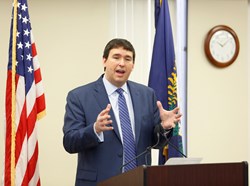Bevin budget remark indicates his view of higher education’s value too narrow
State investment in the arts, humanities also important for economic development
Kentucky had one of nation’s great universities 200 years ago, then destroyed it
It was more than an
ignorant remark by an intelligent, educated man who should know better.
It was another example of an anti-intellectual streak in Kentucky
politics that has always limited this state’s potential for success.
Let’s begin with a short history lesson:
As the year 1816 dawned, Kentucky was heading into economic recession. Lexington was especially troubled, because the invention of the steamboat was shifting commerce from here to the Ohio River cities of Louisville and Cincinnati.
Newspaper publisher John Bradford, statesman Henry Clay and other civic leaders thought higher education was the key to long-term prosperity, not only for Lexington but the entire state. Their dream was to create “the great university of the West” to enrich Kentucky as Harvard and Yale had done for the Northeast.
Transylvania had officially been Kentucky’s public university since 1798. But it was little more than a small, church-run college with no state support. In its first 18 years, Transylvania graduated only about 20 men.
The civic leaders took control of Transylvania’s board and persuaded the Rev. Horace Holley of Boston, a Yale graduate and Harvard board member, to move to Lexington and turn their school into a great university. Between 1818 and 1825, he did just that.
With initially generous government support, Holley hired prominent professors, rebuilt Transylvania’s law school and started what soon became one of the nation’s best medical schools. Enrollment and graduation numbers soared as Holley attracted the region’s brightest students. Many of them would become important leaders, advancing Kentucky’s economy and national stature.
Thomas Jefferson admired Holley and used Transylvania as a model for his University of Virginia. He even warned skeptics that if Virginia did not invest in a great university, its brightest young men would leave for the Northeast or Kentucky.
But by the mid-1820s, Kentucky politicians had other priorities and cut state funding for Transylvania. That forced the university to raise tuition, which angered the public. Sound familiar?
Gov.
Joseph Desha justified cutting Transylvania by stoking public
resentment against “dandies” and educated “elites.” By 1827, Holley was
so fed up that he left Kentucky. Transylvania’s enrollment and status
plummeted, and it would take more than a century for it to rebound as a
private liberal arts college.
Kentucky basically gave up on public higher education until after the Civil War, when federal land-grant money created what is now the University of Kentucky. Its success later led to creation of regional universities after the turn of the last century.
But higher education in Kentucky has always been a story of missed opportunities and two steps forward, one step back. Voters and their representatives in Frankfort rarely have appreciated the value of long-term investment in education as some other states have, and the results speak for themselves.
There is nothing wrong with “workforce development” programs. Kentucky needs more trained technicians, just as it needs more college-educated engineers, scientists and business professionals.
But the kind of anti-intellectualism Bevin seems to embrace is short-sighted in two ways.
First, he seems to view education only in terms of training workers for jobs rather than educating people to be informed citizens and well-rounded people. Higher education is about enriching people’s lives, not just their bank accounts.
But even if Bevin believes the state’s investments should focus on “practical” education to produce specific economic results, his approach is still short-sighted. The global economy is increasingly driven by creativity and innovation. Knowledge of the humanities, language, culture and the arts has never been more important.
We frequently see news stories now about top technology companies hiring liberal arts graduates because of their creativity, mental flexibility, diverse knowledge and skills in critical thinking and communication.
As the late Steve Jobs, founder of Apple Computer, once said: “It’s technology married with liberal arts, married with the humanities, that yields the results that make our hearts sing.”
If Kentuckians want to be leaders and innovators in the 21st century economy — and not just the technicians who implement other people’s ideas — we must invest more public money in higher education that goes well beyond “workforce development.”
You get what you pay for, and Kentucky’s problem is that it always has.
Let’s begin with a short history lesson:
As the year 1816 dawned, Kentucky was heading into economic recession. Lexington was especially troubled, because the invention of the steamboat was shifting commerce from here to the Ohio River cities of Louisville and Cincinnati.
Newspaper publisher John Bradford, statesman Henry Clay and other civic leaders thought higher education was the key to long-term prosperity, not only for Lexington but the entire state. Their dream was to create “the great university of the West” to enrich Kentucky as Harvard and Yale had done for the Northeast.
Transylvania had officially been Kentucky’s public university since 1798. But it was little more than a small, church-run college with no state support. In its first 18 years, Transylvania graduated only about 20 men.
The civic leaders took control of Transylvania’s board and persuaded the Rev. Horace Holley of Boston, a Yale graduate and Harvard board member, to move to Lexington and turn their school into a great university. Between 1818 and 1825, he did just that.
With initially generous government support, Holley hired prominent professors, rebuilt Transylvania’s law school and started what soon became one of the nation’s best medical schools. Enrollment and graduation numbers soared as Holley attracted the region’s brightest students. Many of them would become important leaders, advancing Kentucky’s economy and national stature.
Thomas Jefferson admired Holley and used Transylvania as a model for his University of Virginia. He even warned skeptics that if Virginia did not invest in a great university, its brightest young men would leave for the Northeast or Kentucky.
But by the mid-1820s, Kentucky politicians had other priorities and cut state funding for Transylvania. That forced the university to raise tuition, which angered the public. Sound familiar?
Kentucky basically gave up on public higher education until after the Civil War, when federal land-grant money created what is now the University of Kentucky. Its success later led to creation of regional universities after the turn of the last century.
But higher education in Kentucky has always been a story of missed opportunities and two steps forward, one step back. Voters and their representatives in Frankfort rarely have appreciated the value of long-term investment in education as some other states have, and the results speak for themselves.
There is nothing wrong with “workforce development” programs. Kentucky needs more trained technicians, just as it needs more college-educated engineers, scientists and business professionals.
But the kind of anti-intellectualism Bevin seems to embrace is short-sighted in two ways.
First, he seems to view education only in terms of training workers for jobs rather than educating people to be informed citizens and well-rounded people. Higher education is about enriching people’s lives, not just their bank accounts.
But even if Bevin believes the state’s investments should focus on “practical” education to produce specific economic results, his approach is still short-sighted. The global economy is increasingly driven by creativity and innovation. Knowledge of the humanities, language, culture and the arts has never been more important.
We frequently see news stories now about top technology companies hiring liberal arts graduates because of their creativity, mental flexibility, diverse knowledge and skills in critical thinking and communication.
As the late Steve Jobs, founder of Apple Computer, once said: “It’s technology married with liberal arts, married with the humanities, that yields the results that make our hearts sing.”
If Kentuckians want to be leaders and innovators in the 21st century economy — and not just the technicians who implement other people’s ideas — we must invest more public money in higher education that goes well beyond “workforce development.”
You get what you pay for, and Kentucky’s problem is that it always has.
It’s technology married with liberal arts,
married with the humanities,
that yields the results that make our hearts sing.
--- Steve Jobs, Apple Computer founder



